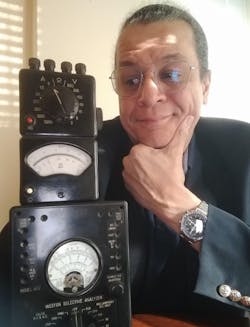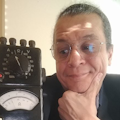Evaluation is Engineering
By Alix Paultre
This column is part of an informal series of thought pieces expressing our expanded editorial philosophy, and the direction we are taking Evaluation Engineering. This way we hope to reflect the changing role of evaluation technology in electronic design engineering. The new world of the fourth industrial revolution is a direct result of advances in precision in both core technologies and their implementation, and the evaluation technologies that enabled those advances.
It’s been an interesting couple of decades in the electronics industry. Ever since the commercialization of electronic technology in the middle of the 20th century, the pace and scope of development has been unprecedented in human history. This near-exponential rate of development is creating a disruptive state of evolution at every level and facet of society.
It took a couple of centuries from humankind to migrate from open-flame weapons to breech-loading cartridge-based rifles, and even societies that prided themselves upon their advancement only discovered hygiene in modern history. In contrast, we’ve gone from a three-legged transistor in a ceramic package to advanced 3D system-on-chip (SoC) solutions in a matter of decades.
Precision measurement is at the heart of all advancement. Antoine LeCoultre created the Millionometre, the first instrument capable of measuring the micron, to refine the manufacture of watch parts in 1844. The very art of precision timekeeping led industrial and technical development, and today time is not only a critical component of every intelligent system, but is also an example of the commoditization of advanced technology. The world is awash in precision timekeeping, literally free to anyone who can capture the signal.
There is no precision without feedback, and most of evaluation engineering was a specialized space, dominated by specialists using single-purpose devices addressing a specific facet of the application addressed. Just as timekeeping was once a full-time job for the person responsible for the village clock, for example, performing advanced system test was once the realm of resource-rich laboratories.
Today, everyone is an evaluation engineer. Every electronic product and device designed today is developed in an environment of constant test, measurement, evaluation, and specification. The devil is truly in the details, and it is critical that the lines on your ruler are clean, precise, and very close together. For example, the difference in a power system being 96% efficient vs. 98% efficient can be measured in dollars and cents, in lost revenue due to poor battery life or other manifestation of poor power management.
This means getting your hands on the best and most versatile tools available, and using them at every stage of product design. Implementing advanced system topologies, high levels of sensor integration and fusion, heterogeneous computing, and other next-generation functionalities is impossible without the latest in testing technologies and methodologies. Our coverage of how these technologies can aid you in your efforts is one of our primary goals. Encouraging discovery through interesting articles and webinars, providing news on the latest tools and techniques, and presenting you with the information you need to choose which is best for you, are among some of our others.
The capability and availability of advanced test and evaluation systems is impacting every level of society. Bridges and roads now have the ability to monitor themselves, for example, alerting civil engineers to pending damage and other predictive maintenance functions. Even old-timey electromechanical applications are being rejuvenated by the sensing and monitoring capabilities provided by Industry 4.0-level solutions. This and other evolutionary aspects of evaluation engineering will be among the things in our expanded coverage of the test & measurement space.
About the Author
Alix Paultre
Editor-at-Large, Electronic Design
An Army veteran, Alix Paultre was a signals intelligence soldier on the East/West German border in the early ‘80s, and eventually wound up helping launch and run a publication on consumer electronics for the US military stationed in Europe. Alix first began in this industry in 1998 at Electronic Products magazine, and since then has worked for a variety of publications in the embedded electronic engineering space. Alix currently lives in Wiesbaden, Germany.
Also check out his YouTube watch-collecting channel, Talking Timepieces.

